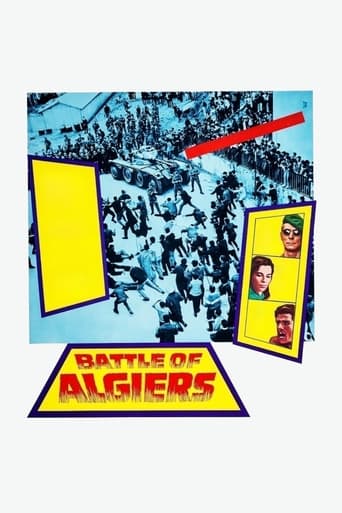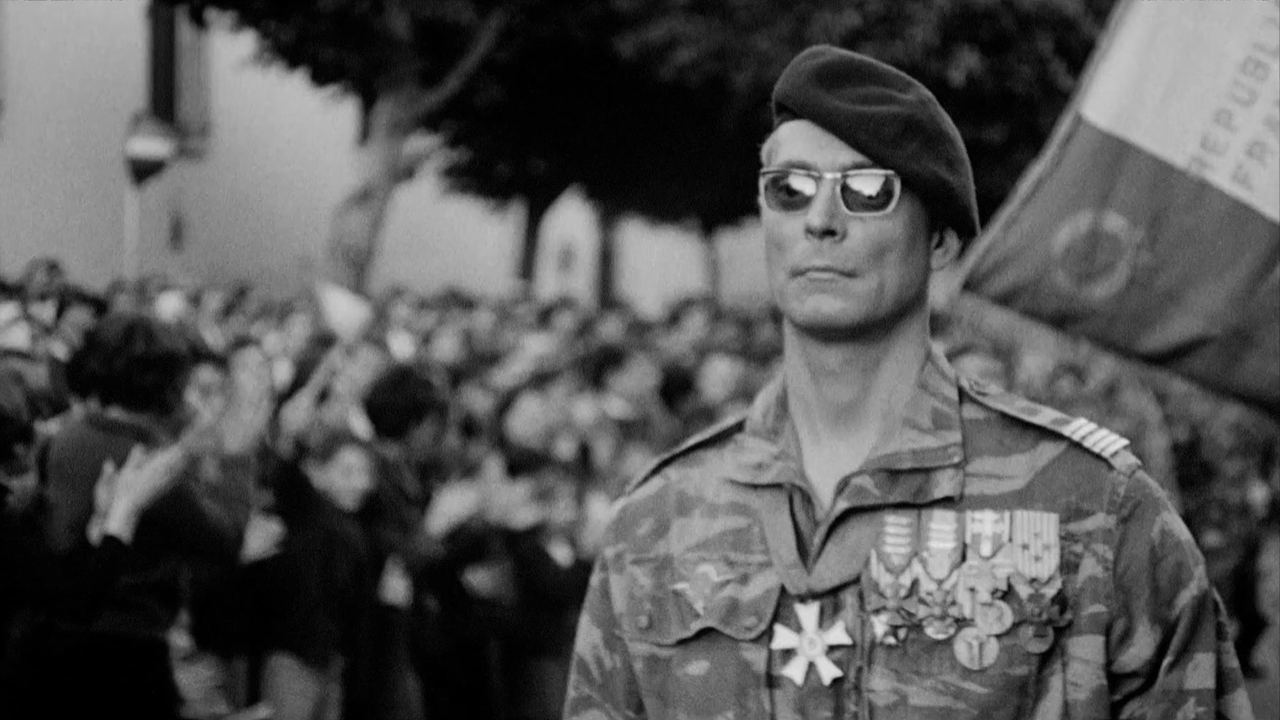Artur Machado
This film was commissioned by the Algerian government to show both sides of the conflict in the war for independence against the French during the 1950s. The way it is directed in black and white together with the naturalness of the actors and the realism of the violence seems almost a documentary. Of good historical value and with an end with good message.It had its relevance at the time and I consider it a good film, but unfortunately it is dated: although the theme of war is always timeless and parallels can be established with current conflicts, there are already better films within the genre with best script and that appeal more to the casual viewer. I recommend this one only to historians or movie buffs.
Morten_5
With the Italian-Algerian film "The Battle of Algiers" from 1966, Italian director Gillo Pontecorvo managed to create a timeless classic and a great depiction of a long and fierce conflict between the French colonial power and the Arab population in the city of Algiers. Shot in an Italian neorealism style and with a documentary-type editing and effective black-and-white photography, the film has all the aesthetics to give to viewer the feeling of being there, in the centre of actions, showing that both of the parts of the conflict were guilty of awful crimes.
Rob Starzec
From the title I expected this to be a war movie, but I did not realize Algiers is a city, and the battle is actually a struggle for Algerians to live in their home country without fear of the French who are suppressing them.I've seen very critically acclaimed classic foreign films before, so I guess I might have had my expectations too high. For example, two of my favorite foreign films are "Bicycle Thieves" and "Rashomon," but those films actually do interesting things with their camera-work. With The Battle of Algiers we just get a lot of standard (boring) camera-work with a lot of static shots to focus on conversations about the action rather than focusing on the action itself.The best aspect of the film is the characters who are a part of the rebellion and their motivations. We are introduced to one of the main characters in a very interesting way - this secret group of rebels does an initiation on Ali by checking to see if he would be loyal enough to shoot a cop, but they don't tell him this. We can see the manipulation this group exercises, though in their eyes it is necessary recruitment, and we should see it as this too since it is the Algerians who are the victim to French occupation of the city of Algiers as well as of the entire nation of Algeria.With the filmmakers choosing to revisit a scene from different view points there is obviously non-linear chronology, but I only understood this at the beginning and towards the end of the film. I was confused how the scene fit into the scenes surrounding it when it was shown for the second time in the film. I will have to rewatch this film some time in the future - after all it is regarded as one of the most important films ever made.I think I enjoyed the conclusion of this film much more than any part which preceded it, and that's because the conclusion is the most inspirational sequence of the entire movie. It is uplifting to see how Algerians rise up again years after the first rebellion group is decapitated (a metaphor you will understand if you watch the film), and this happens without great explanation. The message implied by the film is that this first group of rebels may not have been successful, but the group inspired the people of its nation to stand strong for justice.
Sindre Kaspersen
Italian screenwriter and director Gillo Pontecorvo's feature film which he wrote with Italian author and screenwriter Franco Solinas (1927-1982), is inspired by a memory from 1962 which is based on personal experiences. It premiered In competition at the 27th Venice Film Festival in 1966, was shot on locations in Algeria and is an Italy-Algeria co-production which was produced by producer Saadi Yacef. It tells the story about the political and ideologically ingrained liberation front in Algeria, the militaristic and ideologically ingrained French Army and the people of Algeria who had been living under the Regency of Algiers (1525-1830) and under French rule since the annexation of Algiers, Algeria in 1830 by the then Kingdom of France and how they changed the history of Algeria. Distinctly and precisely directed by Italian filmmaker Gillo Pontecorvo (1919-2006), this quietly paced fictional tale which is narrated by a narrator and interchangeably from multiple viewpoints, draws a densely measured and retrospective portrayal of a mid-20th century war regarding colonization and a country's struggle for independence and self-determination whilst living under another country's rule. While notable for its atmospheric milieu depictions and reverent cinematography by Italian cinematographer Marcello Gatti (1924- 2013), this narrative-driven story about paramilitary recruitment, bilateral relations between France and Algeria and the strategic, totalitarian and barbaric methods used by both sides of this massacre of human lives which were as atrocious as those used in the preceding Second World War (1939-1945) where France, amongst many other countries, was annexed by Germany and a precursor of numerous later wars which continued the annihilation of the living, the convenience of impunity which exemplifies inequality for all those human beings on this planet who has and has had the ability to go through this life without killing anyone of their fellow human beings and the should be abolished and spiritless culture and industry of death where saving bullets is prioritized over saving lives, reflects this historic, incoherent, unjustifiable and downright ignorant notion that a five letter word can only be achieved through violation of international law and the sometimes though not always unintentional murder and slaughter of both involved and neutral bystanders which at any given time might be babies or children guilty only of being born, whose deaths are under no circumstances defensible by this la-la land term called collateral damage, and is no eulogy or glorification, reverence or vindication of retaliating militaristic violence concealed by grandiloquent codes of honor, but rather an understated elegy which was initiated by a living insider witness of these historical events and member of the National Liberation Front Algerian and made eighteen years after many Palestinian Arabs were driven of their homes in Israel, escaped and laws were passed by the introductory Israeli government which prevented them from returning to their homes or claiming their property.Released many years after an Egyptian goddess may or may not have existed in ancient Egypt, three years after a French filmmaker made a narrative feature called "Muriel" (1963), two years before a person with the given name Susan wrote: "I'm learning to bring judgment against the world.", six years before an American filmmaker named Dick Richard made a feature film regarding a sixteen-year-old man who dreamed of becoming a cowboy, was recruited by a group of cowboys, got the feeling of belongingness, started believing that his leader was sent to do what he did by
and ended up on the prairie holding his hat on his chest whilst a river was running out from his eyes after having buried all of his friends in the ground whilst a song written by an English poet in the late 1790s called "Amazing Grace" was sung by a female voice, eleven years before the guillotine was abolished in France, twenty-four years before an American group of musicians called Guns N'Roses sang the words: "
and history hides the lies of our civil wars
", twenty-five-years before an American singer and pianist with the middle name Ellen sang the words: "
I've been looking for a savior in these dirty streets
", forty-six years after a twenty-six-year- old Tunisian street hawker ended in self-immolation in Ben Arou, Tunisia after allegedly having been assaulted by a female municipal officer and in doing so initiated a revolution, forty-eight years after a Norwegian singer named Anne Grete Preus sang the words: "
consider carefully what you should mean - - it can become costly to stand alone
" which originated from an ironic poem written in 1963 by a Norwegian 20th century author and eyewitness of this battle named Jens Ingvald Bjørneboe (1920-1976) and forty-nine years after an Iranian-Swedish émigré, refugee and musician sang her own written words: "
Just because its black in the dark - - doesn't mean there's no colors
", depicts some dense studies of character and contains a great and timely score by Italian composers Gillo Pontecorvo and Ennio Morricone. This historic, reflective and humane testimony and reconstruction of real events from the late 1960s which is set in Algeria in the late 1950s and early 1960s when a French-Algerian historian named Danièle Djamila Amrane-Minne collaborated with the persons who were most instrumental in the armed conflict, and where the actions and the views of men from both sides are presented and informatively depicted, is impelled and reinforced by its cogent narrative structure, subtle character development and continuity, the self-explanatory and alluding comment by a member of the French army after dressing an Algerian prisoner in a French uniform: "Now, he is nationalized." and the many good acting performances by French and Algerian citizens, actors and actresses. A cinematographic and silently perspicacious narrative feature.


 AD
AD






